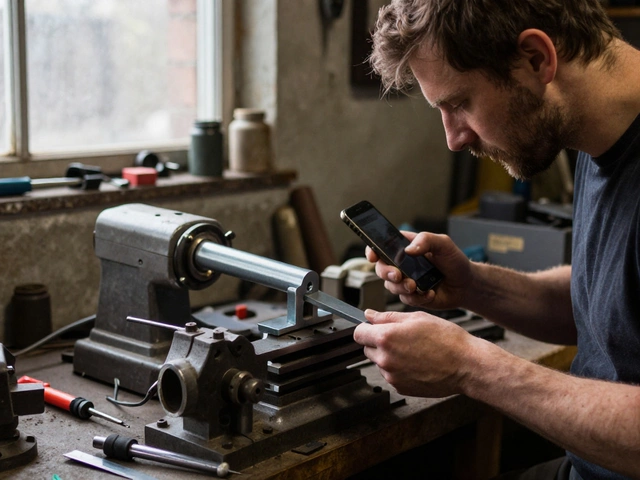Local manufacturing isn't just about making goods closer to home; it's about reshaping the fabric of society. One major impact is the economic boost it gives to communities. When local factories start producing, money that would've gone elsewhere stays in the area, circulating within the local economy. This creates a ripple effect, benefiting not only the factory workforce but also local businesses through increased spending.
Another key aspect is job creation. With jobs being a cornerstone of stable communities, manufacturing plants open up countless opportunities. From skilled labor to administrative roles, these jobs provide more than just income; they offer career paths and the chance to build a better life.
Economic Boost
When we talk about local manufacturing, the most immediate impact we see is the injection of cash into the community. Unlike importing goods, local production keeps money circulating within the local economy, leading to widespread benefits.
One noteworthy fact is that for every dollar spent on locally manufactured goods, a greater portion stays within the community than if you were buying from a big chain or international source. This isn't just speculation; a report from the British Manufacturing Authority highlights that local businesses return about 45% back to the community, compared to just 15% when shopping with multinational retailers.
By supporting local manufacturers through government schemes, regions can see significant growth in their infrastructure. This can mean better roads, improved public services, and enhanced technological advancement. A case in point is the revitalization of the Baltic Triangle in Liverpool, which has become a hub of creativity and innovation, thanks in part to local manufacturing initiatives.
A spokesperson from the Federation of Small Businesses remarked, "Local manufacturing doesn't just support the community; it builds the community. A thriving local industry offers stability and growth that trickles down to every resident."
The Ripple Effect
The economic boost goes beyond direct profits for manufacturers. As employment rises, disposable income in the area increases. This results in more local spending on services like restaurants, cafes, and retail stores, creating a positive feedback loop that benefits the local economy.
Moreover, during economic downswings, areas with strong local manufacturing foundations often fare better. They have the flexibility and agility to switch gears, adapt, and survive without as much reliance on fluctuating global markets.
| Impact Area | Local Manufacturing |
|---|---|
| Money Circulation | Higher retention within community |
| Infrastructure Growth | Improved with local investment |
| Resilience | Better in face of global market shifts |
A thriving local manufacturing sector doesn't just build products; it builds a strong, resilient community. It's not just about economics; it's about turning a place into a home where everyone can prosper.
Job Creation
When it comes to local manufacturing, the impact on job creation can be game-changing. Setting up factories in a community pulls in more than just a workforce; it builds a support network of related jobs, from suppliers to logistics.
One of the fascinating things is how these industries reinvigorate areas with potential. According to a study by the Manufacturing Institute, every manufacturing job creates an additional seven supporting jobs in the economy. That's a huge multiplier effect that can transform communities struggling with unemployment.
"Manufacturing jobs offer sustainable employment opportunities that go beyond paychecks. They create skills and ignite economic growth in the regions they thrive," says Sarah Hughes, an economist focused on industrial employment.
Impact on Local Income
Jobs in local manufacturing often pay higher wages than equivalent positions in other sectors. This doesn't just mean more buying power; it means families can afford better housing, education, and healthcare. It's about changing the trajectory of entire households.
Skills Development
With job creation comes the need for skilled workers. Many government schemes now support training programs that equip workers with the necessary skills to thrive in these roles. This not only benefits the individual but raises the skill level of the entire community.
- Local schools and vocational centers often collaborate with manufacturers to tailor programs suited to industry needs.
- On-the-job training offers real-world experience and advancement opportunities.
Opening new job avenues, investing in skills, and elevating living standards—these are just a few ways local manufacturing impacts society. It's a case of not just making things, but also making life better for folks in the community.

Environmental Sustainability
When we talk about local manufacturing, environmental sustainability is a big topic that often comes up. It's more than just a buzzword; it's about how we can produce things without messing up our planet.
Reduced Carbon Footprint
By manufacturing locally, we cut down on the need for long-distance shipping. Fewer trucks and planes mean less fuel burned and a smaller carbon footprint. This is a win for the environment and a big step towards combating climate change.
Encouraging Green Practices
Local factories are often under a spotlight when it comes to their eco-practices. This means there's a big push for them to adopt green technologies like solar power and efficient waste management. Many new setups are even aspiring to be zero-waste!
Here's an interesting fact: A study from 2023 found that businesses implementing sustainable production methods observed a 15% reduction in operational costs. So, being eco-friendly isn't just good for the Earth; it makes good business sense too!
Supporting Local Ecosystems
Local manufacturing has the ability to support local ecosystems when done right. By using local materials processed through eco-friendly methods, we can promote biodiversity and protect natural habitats.
Of course, it's important for local manufacturing units to stay on top of regulations and continually innovate to reduce their environmental impact. This way, they can ensure that while they're giving back to the community economically, they're also nurturing the environment.
Community Development
Local manufacturing plays a huge role in community development, and it goes beyond just creating jobs and economic growth. When industries settle in an area, they naturally become part of the community’s fabric. This often leads to initiatives that benefit the local inhabitants, be it through education or health services. A factory might sponsor local schools or health workshops, creating a positive cycle of investment in human capital.
Infrastructure Improvements
Another plus is the boost in infrastructure. With new manufacturing plants often comes better roads, improved transport links, and upgraded utilities. This not only supports the industry itself but raises the overall standard of living in the area. Access to better facilities can make a world of difference for locals, turning villages into thriving semi-urban areas.
Fostering Local Pride
Importantly, locally made goods foster a sense of pride. People enjoy saying that something they use or consume is made ‘just down the road.’ It builds a sense of community ownership and boosts local identity. When an area is known for producing quality products, it naturally attracts further business investments and tourism, forming a self-sustaining ecosystem.
Environmental Initiatives
Many local manufacturers commit to environmental sustainability, often under pressure from community expectations and government schemes. By operating clean and green, local manufacturing ensures that the progress isn’t at the cost of the environment. Some plants have even turned to generating their own renewable energy, setting an example for others.
| Community Benefit | Percentage of Manufacturers Involved |
|---|---|
| Improving Local Schools | 45% |
| Infrastructure Projects | 50% |
| Environmental Initiatives | 40% |
In essence, the impact of local manufacturing on community development is profound, offering more than just economic gains—it builds a better living environment for everyone involved.

Consumer Benefits
When it comes to local manufacturing, consumers are often the unsung heroes of its success. How so? Well, for starters, buying locally made products often means getting quality items that haven't racked up miles (or carbon miles) traveling from distant lands. This usually translates to fewer middlemen, which can result in lower prices and a direct relationship with producers. Who wouldn't love a good bargain that also supports their community?
Another big plus is reliability. Locally produced goods often come with robust customer support because companies are more accessible and accountable. If something goes wrong, the manufacturer isn't a timezone away. This means better after-sales service and fewer headaches. Just imagine not having to deal with confusing return policies and language barriers—that's consumer nirvana right there!
Environmental Edge
Local production is a win for planet Earth, too. Goods made nearby usually boast a smaller carbon footprint because less energy is used in transportation. Plus, it encourages businesses to comply with local environmental regulations, which can be stricter than those abroad. So every purchase of a locally manufactured item can feel like a small vote for a healthier planet.
Fostering Community Pride
Nothing beats the feeling of buying something truly local - it's like owning a piece of your own story. Whether it's a shirt stitched in a nearby factory or a gadget assembled within your county, the pride of ownership soars. You become part of a wider trend, where the community pays it forward by celebrating its own talent and innovation.
Oh, and did we mention the joy of discovery? Local products often come with unique twists. Maybe the packaging tells a local story, or the materials used have cultural significance. For those who care about where things come from, these little details help build a more meaningful connection.





